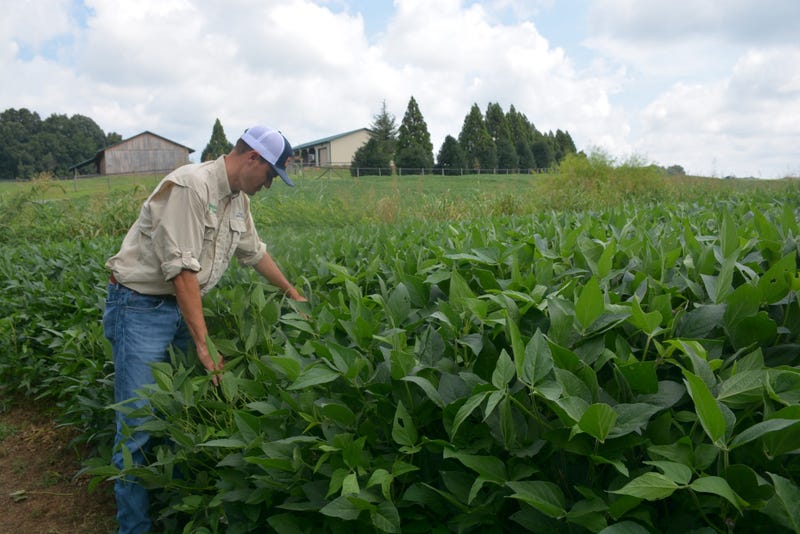
After serving in World War II and fighting in the Battle of the Bulge under the command of General George S. Patton, Marvin Medlin returned home to Monroe, N.C., and immediately began farming. Today, 75 years later, the Medlin family continues to successfully farm the red hills of Union County.
From the beginning, Marvin Medlin believed in innovation and taking care of the land. And that innovation continues today.
“Dad had just a seventh-grade education, but he was innovative and had a lot of vision,” explains Everette Medlin, who farms in partnership with his son, Drew Medlin. Marvin Medlin passed away in 1987.
Everette joined the operation in 1977 after completing his business degree at the University of North Carolina in Chapel Hill and working for a year as a banker. Drew came on board in 2005 after completing his studies in field crops at the Ag Institute at North Carolina State University. Drew’s younger brother Brett was part of the operation until last year when he moved to Charlotte to work in finance.
No-till implemented in 1979
One key innovation implemented by the Medlins, unique for the time, was no-till that the family turned to in 1979 for corn. “Dad was determined he was going to make no-till work,” Everette says.
Everette admits that no-till was a challenge in those early days because they didn’t have the herbicides that are available today. In 1984, when no-till drills came out, the family switched to 100 percent no-till and has farmed all of their ground no-till ever since.
Drew points out the family turned to no-till to help prevent soil erosion, but a main reason is there is no underground water available, so irrigation is impossible on their farm. “No-till is the best way to preserve the amount of water you get from the sky, as well as erosion control,” he notes.
From the beginning, the Medlins have farmed wheat on their Union County farm. Everette notes that the red hills of the Southern Piedmont are made for wheat. The family shoots to grow milling grade wheat because they have good markets to turn to, ADM in Charlotte and Redwood Mills in Newton.
In addition to wheat, the family grows corn, soybeans and grain sorghum on 3,500 acres. Wheat is their “money crop” and they use intensive management practices to meet the strict demands of producing milling grade wheat.
Drew says their intensive management approach includes a split application of nitrogen, plus the use of fungicides and micronutrients. With all of the turkey and poultry farms in Union County, the family has great access to poultry litter which is critical to their fertility program. They use chicken litter on all their crops.
Crop rotation critical
Moreover, rotation is critical for the family. They double-crop about 1,400 to 1,500 acres.
“You can make great wheat with the residue and residual nutrients left from the corn. Usually what we do is put wheat behind corn and early beans and then put out corn and milo behind our wheat-soybean rotation. We strive to get three crops over every two years. Sometimes it won’t work because Mother Nature dictates what you do,” Everette says.
Drew adds that the rotation helps their yields and also offer benefits for weed control. This, plus the use of poultry litter and no-till improves their land.
“We’ve been able to build our soil over time — in areas where we didn’t have such great soil — because of no-till and poultry litter,” Drew explains.
“Wheat and corn put so much organic matter back on the land that we are actually able to build topsoil by using no-till and not disturbing the ground. After five or 10 years you take marginal land and have some pretty good soil,” he says.
For corn, the family likes 30-inch rows and also use split applications of nitrogen in their fertility program. Still, corn isn’t as intensely managed as their wheat.
“With dryland corn, if it doesn’t rain, it doesn’t matter what you do. If you don’t get the rain you need, you’re not going to make good corn. We try to economically farm our corn as much as possible.
100% dicamba soybeans
As for soybeans, the Medlins are 100 percent dicamba and love the technology.
“It really helped us with our Palmer. We still use pre-emergent herbicides to combat Palmer. It’s a great tool because it works,” Drew says.
He notes that drift hasn’t been an issue for them because of good communication with their neighbors and only applying dicamba in the right conditions. Good stewardship is vital.
“We farm around a lot of different people. Communication is the key. All of the farmers where our fields touch, I have their phone numbers. Before I spray, I will call them and ask if their soybeans are dicamba. Most of the time they are, so it is safe to spray. If not, we make sure we leave a buffer,” he says.
One change impacting the family farm is the rapid growth of Charlotte. They farm not too far from the Monroe Expressway, an alternative route to the U.S. 74 corridor located southeast of Charlotte, extending from Stallings to Marshville in Union County.
“We’re just 40 minutes from downtown Charlotte. We can get to Panther Stadium in 40 minutes and not hit a single red light until you get into town,” Everette says.
The growth of Charlotte into Union County has increased the value of land and made finding additional farmland more difficult. The Medlins say they have been fortunate because they’ve been able to grow their operation when elderly farmers retire. They farm both rented and owned land.
The good news is the Medlins have a good working relationship with their landlords who understand farming with most of them still living on their farms. “Most of our land, we have rented for 30, 40 or 50 years. Ninety-nine percent of our landowners are great people who really care about the land,” Drew says.
Watching expenses, good marketing
With low prices and the outlook showing little improvement, watching expenses has become more important for the family. “Every pass you make across the field, you have to make it count,” Drew says.
Marketing is key and forward contracting plus on-farm grain storage is vital.
“In this depressed economy, you’re trying to get every cent you can from your grain. We can hold a fair amount of our crop. Marketing your grain is an important job and making sure you have the right crop insurance agent for your farm is important,” Drew says.
What also helps is the fact Drew’s wife Bailey has experience with Farm Credit. Bailey, who grew up on a cotton and grain farm in Robeson County, worked for the Farm Credit office in Monroe after graduating from Wingate University.
Drew met Bailey at the local office and the two have been married since 2014. They have a son, Hampton, age three, and a daughter Palmer, nine-months old.
“Family is what it’s all about. We do everything we do to make it better for the next generation,” Everette says.



About the Author(s)
You May Also Like






